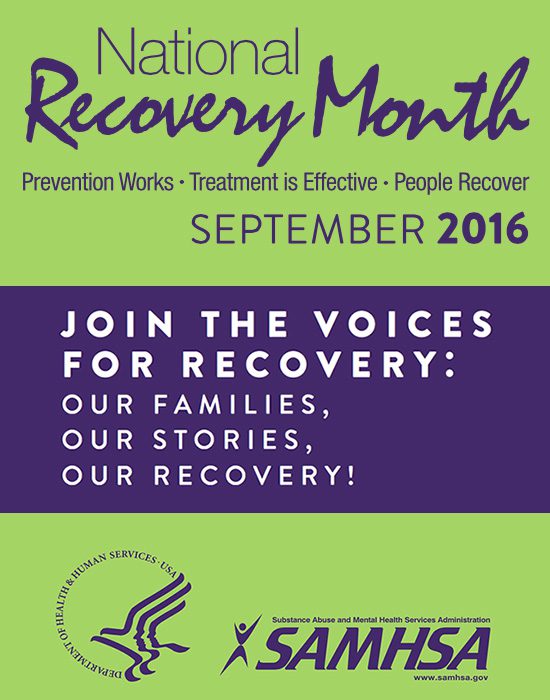Stories of personal recovery, local events and award ceremonies are just part of National Recovery Month, an observance held every September for the last 29 years.

2019 Recovery Month Theme
The theme for Recovery Month 2019 is “Join the Voices for Recovery: Together We Are Stronger,” and explores how integrated care, a strong community, sense of purpose, and leadership can be effective treatments that sustain the recovery of people with mental and substance use disorders.
The 2019 goal is to increase awareness and encourage others to increase the conversation about behavioral health and emphasizes on tackling our nation’s opioid crisis.
Sponsored by the Substance Abuse and Mental Health Administration (SAMHSA), in cooperation with its partners, the campaign focuses on educating Americans that with treatment, anyone living with a substance use disorder and or a mental health condition can lead a healthy, productive and rewarding life.
The theme for Recovery Month 2018 was “Join the Voices for Recovery: Invest in Health, Home, Purpose, and Community.”
The theme of National Recovery Month 2017 was “Join the Voices for Recovery: Strengthen Families and Communities!”

Nationwide, the most recent data suggests there are an estimated 21.2 million Americans aged 12 or older living with a substance use disorder. Only 2 million of them received the treatment they need and deserve.
According to SAMHSA’s 2014 National Survey on Drug Use and Health, nearly 8 million of those people were also coping with the painful symptoms of a mental health issue, illnesses such as depression, anxiety or post-traumatic stress disorder.
Dependency or addiction combined with a mental health condition is referred to as a co-occurring disorder or a dual diagnosis.
What are the Key Messages of National Recovery Month?
Though the theme varies from year to year, the key messages of National Recovery Month stay the same. They include a focus on the following:
1. Prevention
Prevention is the most effective tool for limiting the damage caused by mental illness and the disease of addiction.
Research has shown that symptoms and signals of a behavioral disorder are present two to four years before the disorder actually manifests. The likelihood of developing a substance use disorder increases substantially when mental illness is left untreated, affecting more than 18 percent of those battling poor mental health.
Early intervention after the first serious mental illness greatly improves a person’s chance of recovery.
2. Treatment
Treatment is a vital step for people living with chronic substance abuse and behavioral health conditions. As with other chronic conditions, like diabetes or high blood pressure, recovery takes time and each person is different.
Specialized rehabilitation centers will tailor recovery programs that most often include counseling, medication and support for each person’s specific needs. Access to quality treatment for all people is the goal to strive for.
3. Recovery
Recovery looks different for each person, but defining parameters include good physical health, stable home life and place to live, a sense of purpose either at work, school or volunteering, and a supportive community that provides friendship, hope and love.

What Can We Do Next?
Take the opportunity this month to find a local event celebrating those in recovery or use the National Recovery Month website to promote your own event.
The site also includes more information about recovery, resources for treatment, and multimedia content such as the Road to Recovery Series radio and TV show.
Though society has come a long way, education and public awareness about the disease of addiction and mental illness is an ongoing effort. Too often those struggling with these painful problems are doing so in silence because they’re afraid of how others might judge them.
National Recovery Month is the very least we can do to let them know there’s hope.
Related:
What is the Difference Between IOP and PHP Outpatient Programs?
Why Do People Get Addicted To Drugs and Alcohol?
Exercise, Endorphins and Addiction Recovery
Comprehensive Drug and Alcohol Treatment





